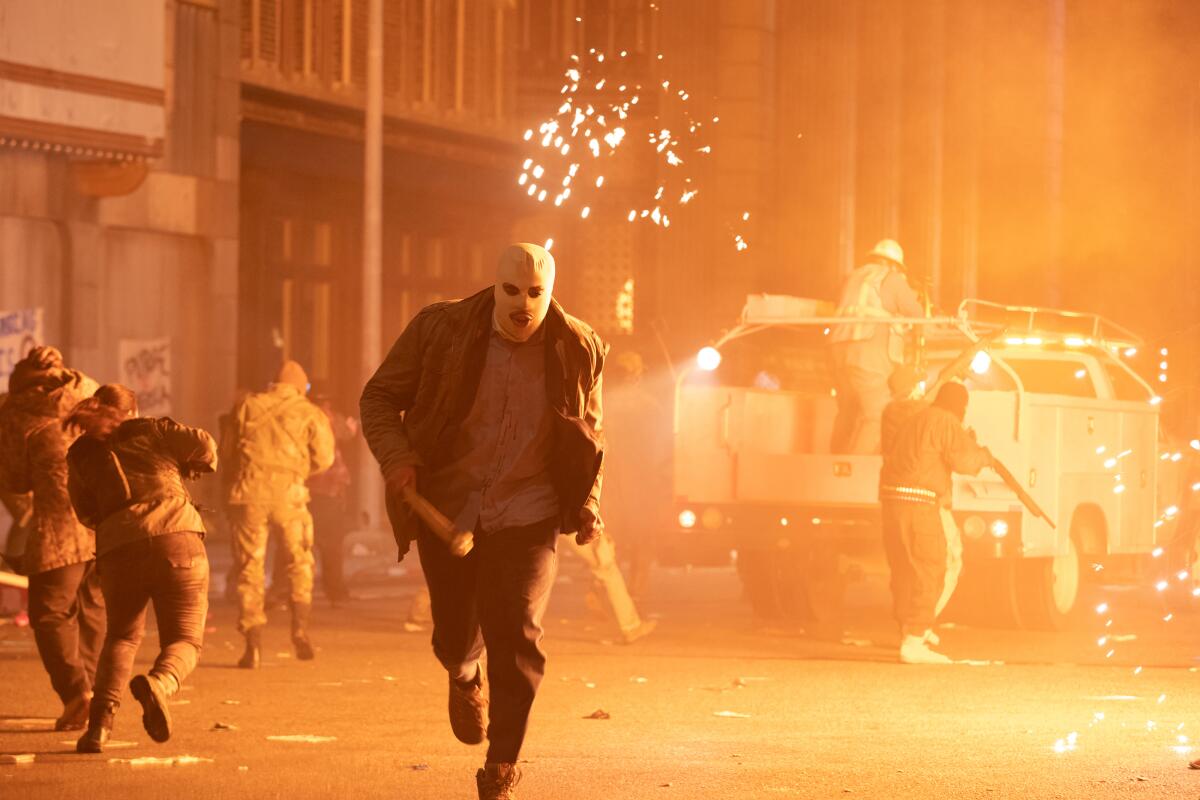Review: ‘Forever Purge’ takes franchise to southern border in a battle for the heart of America

The Times is committed to reviewing theatrical film releases during the COVID-19 pandemic. Because moviegoing carries risks during this time, we remind readers to follow health and safety guidelines as outlined by the Centers for Disease Control and Prevention and local health officials.
In 2013, budget horror production studio Blumhouse produced “The Purge,” a nasty, clever action/horror flick written and directed by James DeMonaco that posited the question: What if all crime was legal for one night? Centering on a wealthy family that attempts to wait out the Purge in their heavily secured home, the film made $89 million on a $3 million budget. Of course there would be more, and the sequels keep making more and more money at the box office.
Now the dystopian concept of the Purge has become a cultural idiom and a vehicle for reckoning with the uglier parts of American life. It was “The Purge: Election Year” in 2016 that struck a bit too close to home, and now the “Purge” formula is a vessel for filmmakers to work out their issues. Mexican filmmaker Everardo Gout takes the opportunity and runs with it in the latest entry, “The Forever Purge,” a collaboration with DeMonaco, who wrote the screenplay.

In “The Forever Purge,” the filmmakers take on the timely topic of immigration at the southern border. Ana de la Reguera and Tenoch Huerta star as Adela and Juan, a Mexican couple who flee across the border to Texas. Juan finds work for a wealthy white ranching family, the Tuckers, though tensions erupt with son Dylan (Josh Lucas), who feels emasculated by Juan’s remarkable horse-handling skills.
But Juan and Adela are committed to their new American lives, which includes the annual “blood holiday” the Purge, instituted by the New Founding Fathers government. The families roll down the shutters and tuck in for a quiet evening protected from the violence: the Tuckers at their posh ranch house, Adela and Juan in a graffiti-scarred shelter.
But when the shutters roll up at 7 a.m., the purging continues, as butcher-knife-wielding bunnies attack Adela at work and black-masked cowboys go after the Tuckers at home. Racist hate groups declaring a “Forever Purge” have launched a coordinated attack with the intent of a “Purge Purification.” Though organized across the country, the Forever Purgers’ aims seem disjointed, waging a class war, perpetuating racist ethnic cleansing, or simply looking to go berserk. With America on fire and the heavily armed populace turning on one another, millions of U.S. citizens, including the Tuckers, with Adela and Juan in tow, make a break for the Mexican border. Viewed with the lens of real-life political and humanitarian issues, the irony is palpable.

“The Purge” films have become a simultaneously disturbing and cathartic viewing experience. Some lines of dialogue and story beats are ripped directly from the headlines of America’s charged political atmosphere. Watching these violent events unfold feels just a bit too plausible, but DeMonaco and Gout cook up such delicious comeuppance that you can’t help but indulge in the pleasure of revenge, even if the terrors and pleasures are incredibly fraught.
Gout and DeMonaco use the idea of the Purge to wrestle with the question, “What is America?” Tucker patriarch Caleb (Will Patton) struggles with what it means to be a proud American. Adela wants America to live up to her ideals. The Forever Purgers have a warped notion, but they’ll fight to the death for this country anyway. And then there’s Chiago (Zahn McClarnon), a tribal leader on whose ancient lands the first and final battles for America are fought. As the blood spills and citizens flee, Chiago’s tenacity reminds us that if America belongs to anyone, it’s him.
Katie Walsh is a Tribune News Service film critic.
‘The Forever Purge’
Rated: R, for strong/bloody violence, and language throughout
Running time: 1 hour, 43 minutes
Playing: Starts July 2 in general release
More to Read
Only good movies
Get the Indie Focus newsletter, Mark Olsen's weekly guide to the world of cinema.
You may occasionally receive promotional content from the Los Angeles Times.










